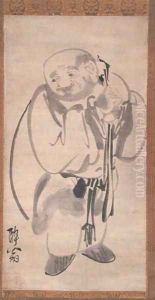Myong-kuk Kim Paintings
Myong-kuk Kim was a Korean painter whose life and career were tragically short due to the historical upheavals of the early 20th century. Born in 1916, during a time when Korea was under Japanese colonial rule, Kim's artistic journey was set against a backdrop of national struggle for independence and identity. Despite these challenging circumstances, he managed to develop a unique artistic voice that resonated with the complexities of his era.
Kim's work was deeply influenced by the tumultuous period in which he lived. The Japanese occupation of Korea (1910-1945) not only imposed restrictions on the cultural and political freedoms of the Korean people but also sought to assimilate Korean culture into Japanese imperialism. This environment of suppression and resistance shaped Kim's thematic concerns and stylistic development. He was known for his ability to blend traditional Korean aesthetics with modernist trends, effectively capturing the essence of Korean spirit and the pain of his nation's plight.
His artistic output, though limited by his short life—ending abruptly at the age of 29 in 1945, just before Korea's liberation from Japanese rule—was prolific and varied, encompassing a range of subjects from landscapes and still lifes to more overt expressions of national identity and sorrow. Kim's work is characterized by its emotional depth and technical precision, employing traditional ink techniques alongside more experimental approaches.
The premature end of Kim's life left a sense of what might have been, as he was emerging as a significant voice in Korean art, poised to contribute to the formation of a distinct national art identity in post-liberation Korea. Despite his brief career, Myong-kuk Kim is remembered as a symbol of the resilience and creativity of the Korean people during one of the most challenging periods in their history. His legacy continues to inspire artists in Korea and beyond, serving as a testament to the power of art as a form of resistance and a source of national pride.
